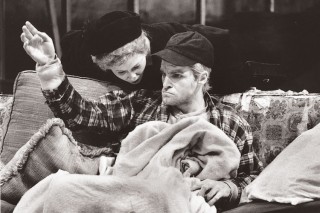Title

In Juilliard Drama’s 1994 production of Sam Shepard’s Buried Child, which was directed by Brian Mertes, Group 23’s Lauren Lovett played Halie and John Henbest was Dodge.
(Photo by Jessica Katz)Sam Shepard’s Pulitzer Prize-winning Buried Child returns to the Juilliard stage from November 21 to 25. Biting, bleak, profound (that is, a Shepard play), it probes the horror that homecoming can be. Shortly after rehearsals began, director Daniel Fish chatted about the production with The Journal.
Sam Shepard’s Buried Child, directed by Daniel Fish. Stephanie P. McClelland Drama Theater, Nov. 21-25.
Body
Buried Child is the story of what happens when Vince (played by Colin Bates), who’s in his 20s, returns to the family farm in Iowa with his girlfriend, Shelly (Wallis Currie-Wood). “It’s about family and the home we leave and are inevitably drawn back to—and how when we are drawn back, it can destroy the person we’ve become,” Fish said. “And that possibility has a terrible, scary hold on all of us.”
One difference between this production and many others (the Steppenwolf production that moved to Broadway in 1996 and Juilliard’s 1994 production for instance), is that those were far more naturalistic, Fish said. So Halie and Dodge, Vince’s grandparents (played here by Brittany Vicars and Lars Berge) were portrayed by actors in their 60s or 70s, or with old-age makeup or wigs. But that won’t be the case with this production.
“I told the actors on the first day of rehearsal, ‘Everyone needs to take their pretend caps off,’ because I’m interested in getting to the reality of the play in a way that has some authenticity for them at this stage of their lives,” Fish said. “You could look at the age issue [all the actors being in their 20s] as a real problem, but rather than an obstacle, I see it as an opportunity to look at the play on a different level,” he added. There’s nothing for them to hide behind. They need to really bring themselves to it moment to moment.” And it’s not just wigs and makeup that won’t be on stage. “The physical production is also really, really spare—it’s basically a barren landscape in which the language of the play can come alive.”
Fish, who describes himself as “making innovative, weird work” for theater, opera, and film, had never directed Shepard before and has chosen the rather unusual approach of treating it the way he would a classical work. “I think that’s a bit of a risk—it’s one thing to do Hamlet on a bare stage with not a lot of costumes, but it’s another to do Sam Shepard with that,” he said. “I’m looking at it the way I would look at Hamlet or King Lear, which are on a very deep level plays about family—and they’re both language plays, too. So one question is, can that work? I think it can.”




